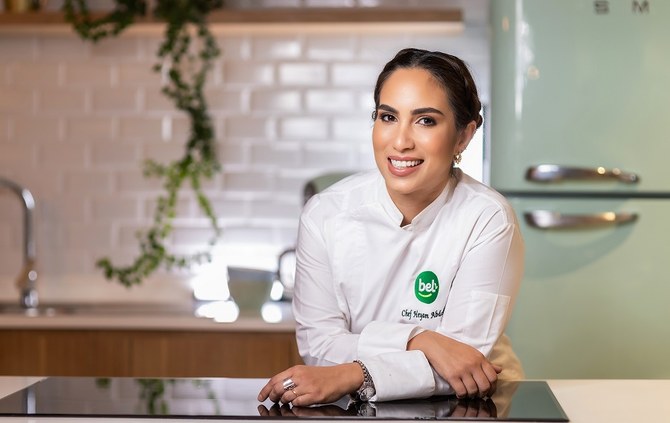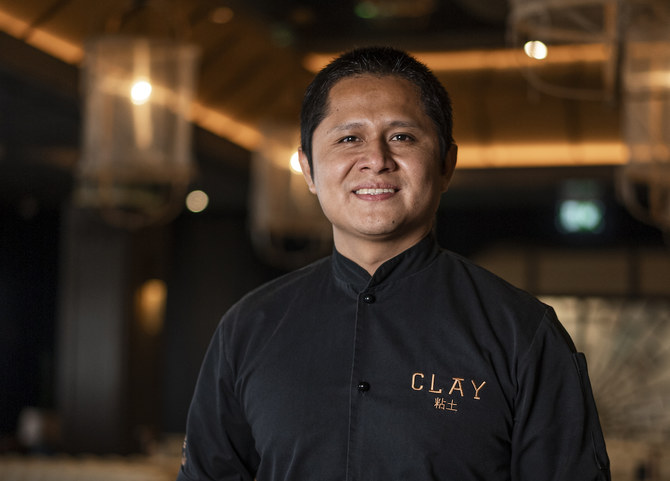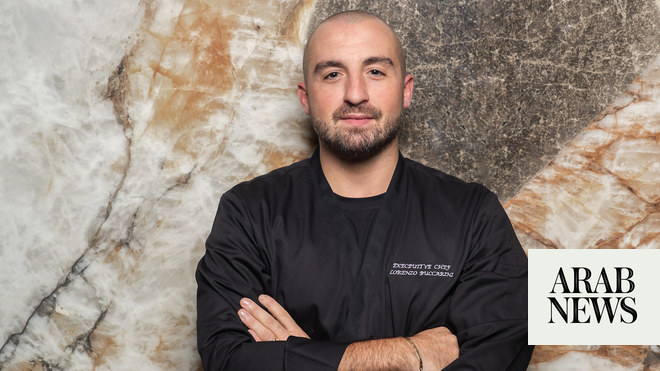
JEDDAH: Chef Javier Arrebola — a Barcelona native who is currently executive chef at The Ritz-Carlton Jeddah — was all of seven years old when his uncle told him he was old enough to bake his own birthday cake.
For the latest updates, follow us on Instagram @arabnews.lifestyle
“Everything I am comes from my family,” Arrebola tells Arab News. “My uncle is a pastry chef. I remember going to spend weekends with him in my childhood. I’d go inside the kitchen and spend time around the oven and the burners to see how everything works. So, when I was getting to the age where I needed to choose what I wanted to do in life, I always said that I wanted to become a chef and work in the kitchen.”
Having lived and worked in Saudi Arabia for more than two years now, Arrebola says life in the Kingdom was almost instantly familiar. “When I moved to Jeddah, I was shocked to see the coffee shops full of guests at two in the morning. This is exactly like back home in Spain — just exchange the coffee or tea for wine, but the concept is the same: Going out to spend time with friends and family,” he says. “The people here are so warm and welcoming.”
Here, Arrebola discusses his enduring love for all things rice, his favorite ingredient, and his management style.
When you started out, what was the most common mistake you made?
This is kind of silly, but when I was at culinary school, every time I put something in the oven, when I needed to take it out again, I’d put it on the tabletop then turn back to close the oven. When I went back to the tray, I’d forget to use the mitts, so, I would burn myself every single time. It took me quite a few burns before I learned.
What’s your top tip for amateur chefs?
Always try and find the best produce. The higher the quality of produce you have, the better the chance that you’ll make a good meal. If you do anything simple with high-quality ingredients, it can turn into something really good.
What one ingredient can instantly improve any dish? (And why?)
It’s a cliché, but I really believe that it’s love. Cooking and eating has everything to do with memory. It’s about what you grew up eating at home, what your mom, your family, your grandma fed you from the moment you were born. And your favorite dishes, for a long time, will be either the dish that your grandma used to cook or simple comfort food. Even if you go to a three-Michelin-star restaurant, you’d change everything just to have that meal one more time. And what makes the difference between this and another meal is the love that that person poured into their cooking.
What’s your favorite cuisine?
I really like all different kinds of cuisine. I love Indian, Thai, pan-Asian, Japanese... Even here in Saudi they have really good traditional dishes that, even after working in Dubai for a long time, I didn"t know about. I"m pretty much open to everything.
What’s your go-to dish if you have to cook something quickly at home?
I’d just go for one meat — like any kind of steak or any fresh fish that I have — then just pan sear with the right seasoning, and some vegetables. In 10-15 minutes, you can get that ready. If the ingredients are fresh, it’ll be a really good meal.
What customer behavior most annoys you?
At the end of the day, our guests are our boss. We can only work in hospitality because we have customers; they pay our salary. The only thing that sometimes can be challenging is the short turnaround time, especially here in Saudi. Everything is last-minute. But, at the same time, that makes it fun. The surprise is exciting.
What’s your favorite dish to cook?
I really enjoy cooking rice dishes. Back home, we have a kind of rice called bomba rice. It"s famous and is used in dishes like paella. I worked for three years with one chef that was really passionate about rice and he taught me a lot.
What is the most difficult dish for you to get right?
I think with every single dish that that you make, even if it’s something you’ve cooked for the last 10 years, you can always find ways to improve it. That’s the evolution of the chef. It’s what makes our job. It’s lovely that every single day is a new day.
As a head chef, what are you like?
Hospitality in general is changing. I remember when I started out, you could still find these chefs who would send dishes flying around the kitchen, and they’d be shouting and loud. That’s the old-school kitchen and I think it’s a thing of the past. Everything is moving to a more logical and well-behaved environment. But still, a kitchen without discipline cannot be a kitchen. At the end of the day, we work with fire and machines, so I don"t think you want a kitchen without discipline.
Chef Javier’s brioche avocado
INGREDIENTS
For the pine nut tarator:
20g toasted pine nuts; 10g chopped parsley; 1 chopped garlic clove; 3g lemon juice; 50g olive oil; 1g sumac; salt
For the caramelized onions:
100g white onion, thinly chopped; 15g oilve oil; 5g balsamic vinegar
For the rest:
3 quail eggs, poached; 1 radish, sliced; 1 avocado, sliced; 1 brioche bread
INSTRUCTIONS:
1. Mix all the pine nut tarator ingredients in a bowl. At the same time, add the olive oil and onions to a pot and cook them on medium heat until soft, then reduce the heat and caramelize slowly until they get a dark brown color. Deglaze with the balsamic vinegar at the very last minute.
2. Poach three quail eggs for 1 min (or longer, as you most enjoy them).
3. Sear the brioche with olive oil and salt, and toast in a hot pan.
4. Spread a spoonful of tarator sauce on top of the brioche and add the sliced avocado. Top with the caramelized onion.
5. Add the poached quail egg on top and garnish with flaky salt. Serve.












